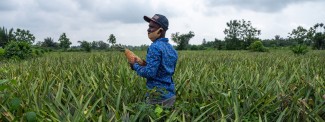Multinationals and governments need to recognize the trade world’s interconnectedness, and its impact
Company activities that incorporate products and services components spread throughout the world are called “value chains”. The “value” in the chain is added by certain elements of production processes in various countries, and, as a result, country economies are increasingly more connected to and dependent on each other.
Value here does not only have a financial and economic dimension, but also, and probably even more so, a social and climatic dimension. These dimensions are important for making value chains sustainable. Joint responsibility and action by stakeholders is required, acknowledging the interdependencies between all.
Moreover, value chains require that developed countries and companies originating in them increase their share of responsibility instead of focusing only on their own goals, as is currently happening in the distribution of vaccines against COVID-19. It seems the developed world is not realizing that the unequal distribution of vaccines is not only unfair, but due to economic interdependencies, there will also be significant damage that puts decades of economic progress at risk for developed and least developed countries (LDCs) alike.
The worldwide intertwining caused by value chains has its positives. For example, some of the world's population has risen above the poverty line, partly due to new connections to global value chains (GVCs), LDCs becoming producers and have expanded roles in the playing field of international trade, versus being only consumers.
However, there are drawbacks. LDCs are still at the bottom of the ladder with activities that add the least value to the chain, and they are not benefitting sufficiently from their roles. For example, African countries’ participation in GVCs is largely through supplying inputs (often raw materials) to foreign firms for further processing. Another negative side effect of global interdependency is the fact that many developed countries are outsourcing their problems to LDCs, for example sending plastic waste abroad to achieve national sustainability goals.
On cost cutting
Previously, multinationals put too much emphasis on cost savings when setting up value chains, avoiding the responsibility of providing employees with decent, safe working environments and respecting human rights, while demanding such from their suppliers.
This is a major barrier to making sustainable value chains work.
Both at the national and company level, there are policies in the developed world aimed at mitigating the risks of vulnerable GVCs. Company responses to overcoming value chain vulnerability include robotization and re-shoring of activities that were previously located in LDCs. For example, there are various initiatives to create local food systems. Although a noble goal, the impact on economies – especially of LDCs – needs to be considered, as those countries may see a decrease in their agricultural exports as a result. It is argued that further domestic support to agriculture in developed countries encourages overproduction, which in turn increases supplies in world markets and depresses prices. Low prices make it harder for producers in developing countries to compete in their home markets as well as international ones, thus reducing incentives for production and retarding the development of the agricultural sector.
The natural reaction of companies in developed countries is to invest more in the preservation and development of knowledge and production lines in their own countries. Investing in critical products and services should, however, be done based on solidarity and interconnectivity with the rest of the world.
On interconnectedness
The global interconnection and interdependence of value chains is such that when we take one domino from the chain, there is a chance that the entire structure will fall and that the poorest countries will suffer most. Global interconnectivity should be taken as a starting point when thinking about sustainable value chains, as opposed to the developed world focusing only on their own sustainability issues.
Multinationals are partly dependent on LDCs for their operations, from producing garments in Bangladesh to cocoa in the Democratic Republic of Congo. Given the competitive pressure these companies experience in international trade, their dominant position also puts more pressure on suppliers in LDCs, and most of these suppliers are micro-, small- and medium-sized companies. These businesses already operate in precarious conditions, and this is being exacerbated by the COVID-19 crisis. The pandemic shows even more the interdependence between companies and countries, and the need for cooperation for equitable access to medical supplies and equipment.
Whose responsibility?
Where does a company's responsibility for the products and services provided by third parties in developing countries begin and where does it end?
Companies are increasingly expected to not only refrain from causing damage to the environment, but to rather make a proactively positive contribution to society, together with partners.
The ball is not only in the court of the business community. Solutions to the associated risks require public and private cooperation in which companies and governments must take responsibility, with citizens also playing a prominent role. If we want to face major challenges, such as sufficient clean water and CO2 emissions reductions, we must look at the entire value chain and its global interconnectedness.
In the everyday reality amplified by COVID-19, the world is confronted with the fact that human behavior is the cause of a lot of misery and can at the same time be the solution. With some good will, developed countries can leverage this crisis as an accelerator to change human behavior. This requires that countries must look beyond resolving their own national and local sustainability issues while ignoring the impact of those solutions in other parts of the world.
Developed countries and multinationals should focus more on dealing responsibly with scarce resources such as labor and the environment. Macro and micro, they must ask whether they are part of the solution or the problem, not only for themselves, but also for others. Developed countries must try to take even more responsibility when designing national policies, and commit themselves to making value chains truly sustainable, because we are all vulnerable, and Mother Earth does not care about the boundaries we have defined.
If you would like to reuse any material published here, please let us know by sending an email to EIF Communications: eifcommunications@wto.org.


